
The foreign relations of Ghana are controlled by the Ministry of Foreign Affairs of Ghana. Ghana is active in the United Nations and many of its specialised agencies, the World Trade Organization, the Non-Aligned Movement, the Organisation of African Unity (OAU), the African Union (AU) and the Economic Community of West African States. Ghana generally follows the consensus of the Non-aligned Movement and the OAU on economic and political issues not directly affecting its own interests. Ghana has been extremely active in international peacekeeping activities under UN auspices in Lebanon, Afghanistan, Rwanda, and the Balkans, in addition to an eight-year sub-regional initiative with its ECOWAS partners to develop and then enforce a cease-fire in Liberia. Ghana is also a member of the International Criminal Court.
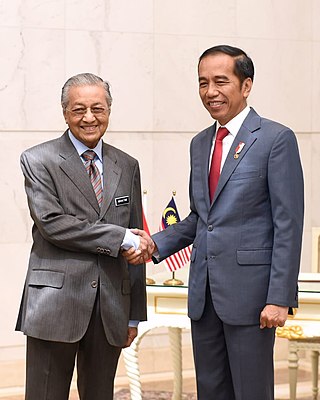
Since independence, Indonesian foreign relations have adhered to a "free and active" foreign policy, seeking to play a role in regional affairs commensurate with its size and location but avoiding involvement in conflicts among major powers. During the presidency of Sukarno, Indonesia's foreign relations were marked by engagement with other newly independent nations in Asia and Africa, as exemplified by the Bandung Conference, the subsequent foundation of the Non-Aligned Movement and a confrontational attitude towards Western powers, justified by a belief in the CONEFO and opposition to what Sukarno termed as NEKOLIM.

Jamaica has diplomatic relations with many nations and is a member of the United Nations and the Organization of American States. Jamaica chairs the Working Group on smaller Economies.

The foreign relations of Laos, internationally designated by its official name as the Lao People's Democratic Republic, after the takeover by the Pathet Lao in December 1975, were characterized by a hostile posture toward the West, with the government of the Lao People's Democratic Republic aligning itself with the Soviet bloc, maintaining close ties with the Soviet Union and depending heavily on the Soviets for most of its foreign assistance. Laos also maintained a "special relationship" with Vietnam and formalized a 1977 treaty of friendship and cooperation that created tensions with China.
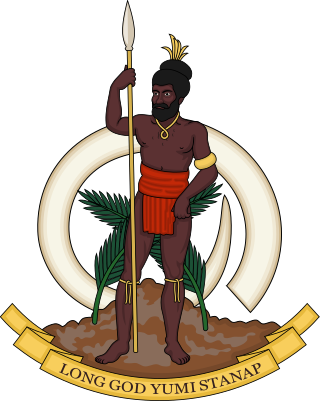
Vanuatu maintains diplomatic relations with many countries, and it has a small network of diplomatic missions. Australia, France, Japan, New Zealand, the People's Republic of China, South Korea and the United Kingdom maintain embassies, High Commissions, or missions in Port Vila. The British High Commission maintained a continued presence for almost a century, though closed from 2005 until reopening in 2019.

The Department of Foreign Affairs is the executive department of the Philippine government tasked to contribute to the enhancement of national security, protection of the territorial integrity and national sovereignty, to participate in the national endeavor of sustaining development and enhancing the Philippines' competitive edge, to protect the rights and promote the welfare of Filipinos overseas and to mobilize them as partners in national development, to project a positive image of the Philippines, and to increase international understanding of Philippine culture for mutually-beneficial relations with other countries.

Peru and the United States established relations on May 2, 1826, following Peru's independence from Spain.

North Korea–Serbia relations are the bilateral relations between Serbia and North Korea. The Socialist Federal Republic of Yugoslavia and the Democratic People's Republic of Korea had established diplomatic relations on October 30, 1948. Relations had been very close during the time of Josip Broz Tito and Kim Il Sung. Both leaders had taken a neutral stance during the Sino-Soviet split and maintained friendly relations with both the Soviet Union and China. Both Serbia and North Korea are members of the Non-Aligned Movement. Yugoslavia, of which Serbia was a part, was one of the movement's founding members. Both countries closed their embassies in each other's capitals in October and November 2001, respectively, for financial reasons. Nevertheless, they continue to enjoy a close relationship. The Serbian Embassy to North Korea is accredited from Beijing, China, and the North Korean embassy to Serbia is accredited from Bucharest, Romania.

Indonesia and Peru established diplomatic relations in 1975. Both nations see each other as an attractive market with good prospects and potentials, and seeks to boost trade relations. Indonesia has an embassy in Lima, while Peru has an embassy in Jakarta. Indonesia and Peru are members of multilateral organizations such as the Asia-Pacific Economic Cooperation, the World Trade Organization (WTO), Non-Aligned Movement and Forum of East Asia-Latin America Cooperation.

Gonzalo Alfonso Gutiérrez Reinel is a Peruvian diplomat. From June 23, 2014 to April 2, 2015 he was Minister of Foreign Affairs under President Ollanta Humala. In 2009 he was appointed Peruvian ambassador to the United Nations, in New York. From 2011 to 2014 he was the ambassador of Peru to the People's Republic of China and non-resident ambassador to Mongolia, Pakistan and North Korea. From 2017 to 2022 he was the appointed ambassador to Belgium, Luxembourg and the European Union. As of May 1st 2023 he was appointed Director of the Diplomatic Academy of Peru. In September 1, 2023 he takes the post of Secretary General of the Andean Community.

APEC Peru 2016 was the XXVIII year-long hosting of Asia-Pacific Economic Cooperation (APEC) meetings in Peru, which was culminate with the XXIV APEC Economic Leaders' Meeting in 19–20 November 2016 in Lima. It marked the second time Peru played host to the APEC, previously hosting in 2008.

The Socialist Federal Republic of Yugoslavia was one of the founding members of the Non-Aligned Movement. Its capital, Belgrade, was the host of the First Summit of the Non-Aligned Movement in early September 1961. The city also hosted the Ninth Summit in September 1989.
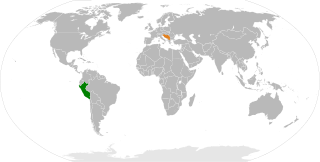
Peru–Yugoslavia relations were historical foreign relations between Peru and Yugoslavia. Both countries had amicable relations and were active in the Non-Aligned Movement which was established in Belgrade in 1961. Peru had an embassy in Belgrade until 2006 and Yugoslavia, later Serbia, had an embassy in Lima until 2009.
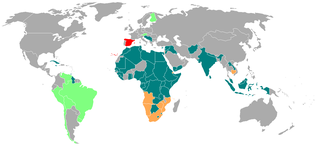
Third Conference of the Non-Aligned Movement on 8–10 September 1970 in Lusaka, Zambia was the third conference of the Non-Aligned Movement. A preparatory meeting of Foreign Ministers drafted a number of resolutions which were considered by the Summit Conference. President of Zambia Kenneth Kaunda opened the conference by underlining non-alignment as "the natural choice at the time of increased hostility created by ideological conflicts in the bipolar world"

The Non-Aligned Movement (NAM) is a forum of 120 countries that are not formally aligned with or against any major power bloc. It was founded with the view to advancing interests of developing countries in the context of Cold War confrontation. After the United Nations, it is the largest grouping of states worldwide.

8th Summit of the Non-Aligned Movement on 1–6 September 1986 in Harare, Zimbabwe was the conference of heads of state or government of the Non-Aligned Movement. 101 countries took part in the summit, 51 of which were African countries. Explicitly expressed South–South cooperation call appeared for the first time in the 1986 NAM final declaration.
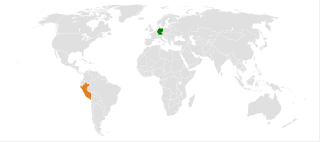
Germany–Peru relations are the bilateral relations between Germany and Peru. The relations are described by the German Foreign Office as "close and friendly". Cooperation between Germany and Peru takes place at both the bilateral and multilateral level.

The 1985 Non-Aligned Foreign Ministers Conference was held in Luanda, capital of Angola from 4 to 7 September with the senior officials meeting being held on 2 and 3 September. The organization of the conference in the circumstances of the ongoing Angolan Civil War was described as a large scale organizational undertaking and a considerable achievement.
The 1983 Conference of Ministers of Education and Culture of the Non-Aligned Movement convened in Pyongyang, North Korea was the first conference of the NAM ministers of education and culture which took place between 24 and 28 September. North Korea's proposal to host this event received acknowledgment and endorsement in the final declaration of the 7th Summit of the Non-Aligned Movement in New Delhi, India earlier that same year.



















